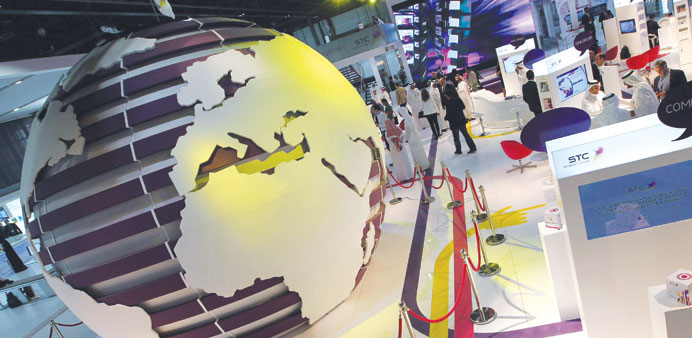Reuters/Dubai
Saudi Telecom Co (STC) was the standout in mixed Middle Eastern share markets yesterday, as the stock surged to an eight-month high after the company agreed to sell its Indonesian unit to Malaysia’s Axiata Group.
STC rose as much as 6.2% to its highest level since January, before giving back some of those gains to end up 3.3% on the day.
The deal is for an undisclosed amount but Axiata said the unit, PT Axis Telekom Indonesia, had an enterprise value of $865mn. The deal may also help STC end a tussle with global banks over a $1.2bn loan tied to the Indonesian firm.
“STC has been re-evaluating its international footprint for a while now, and this is a step in the right direction,” said a Dubai-based research analyst. “However, the majority of foreign exchange risk and volatility, which often results in currency losses, is generated from their stake in Turk Telekom, and the sale of Axis won’t affect these significantly,” he added.
Saudi Arabia’s heavyweight petrochemical sector declined, with its index losing 0.4%, and the banking sector retreated 0.5%.
The Saudi market’s overall index slipped 0.3%, trimming its 2013 gains to 17.3% and leaving the market below the psychologically important level of 8,000 points.
However, “the current narrow range after the last rise is a bullish signal - I’m expecting another rally towards 8,200 points next week,” said Mohabeldeen Agena, head of technical analysis at Cairo’s Beltone Financial.
The Saudi market has eased off after a strong surge in mid-September as investors wait for fresh catalysts that may come in the form of third-quarter earnings announcements; set to begin in early October.
In Qatar, the index slipped 0.2%, extending the week’s losses to 2.6%. Investors continued to cut positions on news that Qatar Petroleum would launch an initial public offer of shares for a unit.
QP has picked two banks to help arrange the IPO, an issue which could be worth around 3.2bn riyals ($880mn), banking sources told Reuters. The IPO may launch by the end of this year.
In Kuwait, the benchmark dropped 1.5% from Wednesday’s four-week high but the Kuwait 15 sub-index, comprised mainly of blue chips, gained 0.9%. Retail investors sold small-caps but blue chips were bought by institutions adjusting positions before the quarter’s end.
“There’s more impetus for institutional investors to buy blue chips - it’s a good time to show end-of-quarter performance on the books,” said Fouad Darwish, senior vice president of brokerage services at Global Investment House. “Even retail investors are jumping on the blue-chip bandwagon.”
Gulf Finance House, a regular retail investor favourite in Kuwait, tumbled 6.5% and was the most active stock on the bourse.
National Bank of Kuwait, the country’s largest listed company by market value, climbed 1.1% to 0.92 dinars. HSBC raised its price target for the stock to 1.15 dinars with an ‘overweight’ rating on Wednesday.
Dubai’s bourse climbed 0.5% to 2,737 points, taking the week’s gains to 2.6%. The market is now very close to this year’s peak of 2,762 points, hit on August 26.
Overall market volatility has lessened in recent sessions as most investors await third-quarter earnings; small-caps have dominated trading. Gulf Navigation surged 13%, leaving it up 58.5% since Monday on the firm’s announcement it plans to sell some ships and might get a cash injection from major shareholders, which it did not name.
In Egypt, Cairo’s benchmark index rose 0.7% to 5,704 points, its highest level since February 14. It has been testing major chart resistance at 5,682 points, the August peak; a rise early next week would confirm the break, pointing up to this year’s high of 5,884.
“The rise above the resistance is a sign that reflects the bulls’ power during the last upward movement - we are expecting the current move to continue towards 5,850 points,” Beltone’s Agena said.
Oman’s market gained 0.7% as Sembcorp Salalah Power and Water Co, in which a unit of Singapore’s Sembcorp Industries has a 60% stake, said its 53mn rial ($138mn) IPO had been completed and was “comfortably oversubscribed” by retail and institutional investors from Oman, Gulf countries and Europe.
Minister for Financial Affairs Darwish al-Balushi said Oman plans to release in January a list of state companies which it aims to privatise; he did not give any details.
Elsewhere in the Gulf, Abu Dhabi’s index ticked up 0.06% to 3,839 points, while Bahrain’s measure edged up 0.06% to 1,197 points.

The deal may help STC end a tussle with global banks over a $1.2bn loan tied to the Indonesian firm
